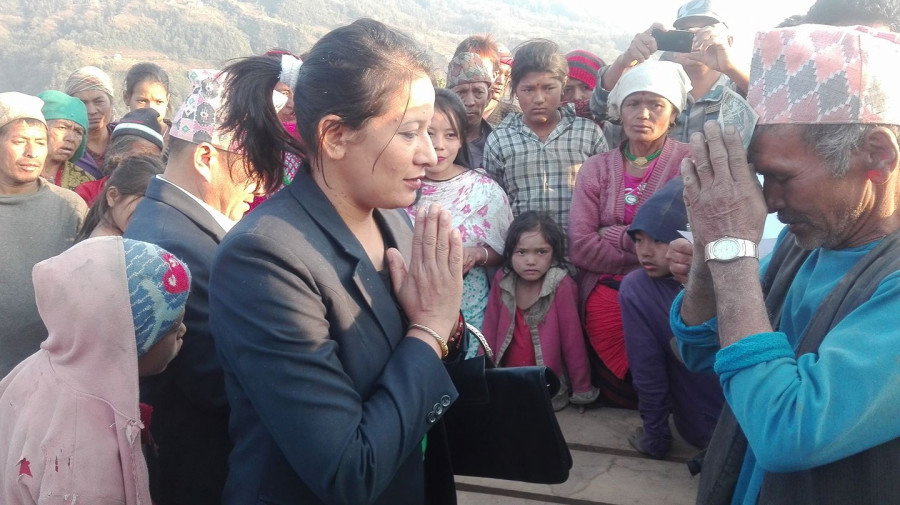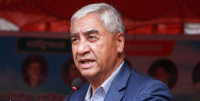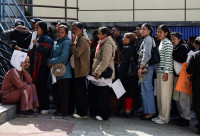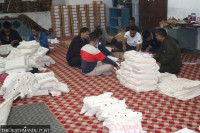National
First Dalit woman CDO says caste discrimination is an affront to society
Born as a girl in a Dalit family meant a lot of struggle for this 44-year-old civil servant, who is determined to work towards fighting the social scourge of casteism.
Anup Ojha
Born as a girl in a Dalit family, for Sita Pariyar, there always was double discrimination.
In a society where caste-based discrimination is still rife and girls and women are struggling for their rights, the best thing that happened to Sita was her parents decided to send her to school.
On Thursday, Sita, 44, became the first Dalit woman chief district officer.
“I have been posted in Humla,” she said. “I am leaving for my workstation on Sunday.”
Born in Bhorle of Kaski district as the fifth child of her parents, Sita started experiencing discrimination since her early days, oftentimes wondering why she was being treated differently and in a lowly manner by others.
As she grew up, she realised she was not treated well because of her caste, she said.
“Things were not easy. We were not allowed to touch water taps. Marriage ceremonies and temples were not meant for us. People would not eat or drink whatever we touched,” said Sita about the discrimination she faced. “This is not just about me, every Dalit member in our country goes through this same experience of humiliation and insults.”
But she refused to give up, she said.
“I decided to overcome the obstacles. Perhaps the discrimination I faced made me work hard to achieve something so that I could fight back and work towards ending this scourge from the society,” she said. “For that, I needed to study. I needed to go to a university.”
Sita completed her primary education from a school that too had her name—Sita Primary School in her village.
After her secondary education in Chandra Prabhu Higher Secondary School Rupa Rural Municipality-6 of Kaski district, she came to Kathmandu for higher education.
She obtained her master’s degree in sociology from Tri-Chandra College.
Her recent posting was in Bhaktapur as an assistant chief district officer.
“I worked with her for four months. It was a coincidence that both of us were women. Sita is a hardworking official with commitment and integrity,” said Rudra Devi Sharma, chief district officer of Bhaktapur. “This is a proud moment for me also that my colleague has been promoted. She has become the first chief district officer from the Dalit community. It’s all because of her hard work.”
Sita entered civil service as a section officer on September 4, 2011 from an open category.
She worked as a local development officer for Dolakha and Bhojpur districts in 2015 and 2017, respectively.
Then she served as a chief administrative officer of three local bodies: Chandragiri Municipality (2018), Janakpur Dham Sub-Metropolitan City (2019) and Kirtipur Municipality in (2020).
Sita’s brother Shyam, 52, shared that he feels proud that his sister has achieved something no woman from their community has.
“Our parents are no more. If they were alive, they would have definitely been so proud of her,” said Shyam. “Despite all odds, my parents decided to send her to school and college. My father had a great desire to educate her,” Shyam, who does tailoring work, told the Post over the phone from Lekhanath, Pokhara.
Dalits in Nepal for long have been far from state organs, with only a few in civil services.
A National Human Rights Commission report shows the representation of Dalit community in the state appratus is minimal.
According to last year’s report of the commission, of the total 88,578 people in civil services, only 1,971 are from the Dalit community, which is 0.2 percent. The report shows the presence of the Dalit community in Nepal Police is 9.45 percent, 8.14 percent in Nepal Army and just 1 percent in the judicial sector.
Pradip Pariyar, executive chair of Samata Foundation, an independent think tank that studies caste-based discrimination and marginalisation, termed Sita’s appointment as chief district officer a positive and a proud moment for the entire Dalit community and milestone in the fight against caste-based discrimination in some extent.
“But if we look critically, it is unfortunate that we are celebrating it in the 21st century,” he said. “This also shows the stark reality of Nepal and we Nepalis as to how our society still needs a lot of transformation.”
As Sita prepares to take up her new assignment, she says that while performing her duties, she would also make extra efforts to ensure that no one faces discrimination just because of their caste.
Asked if she ever faced discrimination while serving at different offices, she said her co-workers and colleagues have always been nice to her.
“But the fact is caste discrimination is a bigger problem, and it’s rife everywhere,” she told the Post.
She recalled how people looked at her with disbelief when she was appointed a local development officer in Bhojpur.
“I could sense the general impression among many like ‘what will this Dalit woman be able to do’,” she said. “People were sceptical about me and my capability. But after my tenure, when they bade farewell to me, they were appreciative of my work. Such small achievements make me feel proud and give me energy to do better.”
Sita is currently the second chief district officer from the Dalit community. Santa Bahadur Sunuwar is the chief district officer of Bardiya.
The first chief district officer from the Dalit community was Man Bahadur Bishwakarma.
Sita says while the entire Dalit community is still backward, when it comes to women, they are more oppressed.
“Education is the key, as it empowers women,” Sita said. “As a chief district officer, I will work towards ensuring social justice. Caste-based discrimination is an affront to society.”




 22.17°C Kathmandu
22.17°C Kathmandu.jpg)














